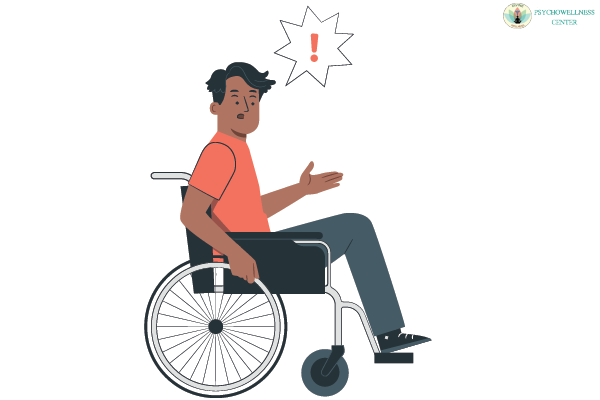An extremely uncommon condition is called body integrity identity disorder. When your mental and physical self-images are at conflict, it occurs. You can have a strong desire to surgically remove a limb or seek paralysis if you have body integrity disorder (BIID). This disorder is also termed as body integrity dysphoria. Patients with body integrity dysphoria choose to get an operation in an effort to find their true self. Between the ages of eight and twelve, the desire for amputation first develops. Patients with body integrity dysphoria experience tremendous distress, and the majority of them didn’t feel pleased till after they had surgery.
Impact of BIID on health
Early childhood has been linked to body integrity identity disorder. You feel that your body must be changed in order for you to feel complete or satisfied as a result of this disease. Depressive symptoms and mood disturbances might happen when you don’t feel good about your body. These correspond to the mental health effects of BIID’s stressful and emotional load or burden. The identity condition known as BIID has been linked to genetic ability as suggested by studies.
People with BIID want to be their “true selves,” which frequently includes desiring a handicap or surgery to make them feel “whole” on the inside. Recent studies have begun to relate this sensation to specific psychiatric and neurological causes. BIID and other identity disorders like transsexualism and gender identity disorder share many characteristics. Chronic dysphoria, or the belief that one’s body is not what it ought to be, is a symptom of BIID. In extreme circumstances, people with BIID will do whatever to damage or cut away themselves without medical assistance. Unfortunately, persons with BIID may turn to self-mutilation if they can’t get the care they need. An obsessive drive to surgically remove a limb can be fatal if the removal is performed improperly.
Signs and symptoms of body integrity identity disorder
Stress, depression, mood disturbances, and anxiety are some of the symptoms of body integrity dysphoria that are frequently experienced. Body integrity dysphoria and body dysmorphia are commonly confused. Body dysmorphia is a syndrome where people constantly have negative thoughts about their body, which affects their quality of life. There were also discovered to be connections between body integrity dysphoria and anorexia nervosa. Consult a Best clinical psychologist in India, or a Best Counseling psychologist to plan therapy for BIID.
Distressing thoughts can be harmful or damaging to a person’s social, emotional, and professional lives. Those who cannot afford surgery or cannot locate a surgeon who will surgically remove the limb may attempt to remove the part on their own.
Causes of body integrity identity disorder
Nobody really understands body integrity identity disorder. Although there isn’t a single known source of BIID, there are theories regarding where it came from.
According to some researchers, the following things could lead to BIID:
-
Traumatised early childhood
-
Tendencies toward obsession and obsession
-
Identification with individuals too often
However, the main working idea among psychologists and neurologists is that BIID results from incorrect brain mapping. Your body doesn’t behave or feel the way your brain thinks it should.
Diagnosis of body integrity identity disorder
It can be difficult to diagnose body integrity identity disorder. Although the desire for amputation has a name, diagnosis still requires patients with the illness to be honest with their doctor. Your doctor might start by investigating brain activity if you’re experiencing a sense of disconnection from your body. They’ll investigate whether this disconnection between the mind and the body is brought on by a benign brain tumour or another underlying illness.
Treatment of body integrity identity disorder
Presently there is no accepted treatment for body integrity dysmorphia. Thought-behavior therapy and selective serotonin reuptake inhibitors are common forms of treatment (SSRIs). The depressed symptoms associated with body integrity dysmorphia are lessened with antidepressants. Antidepressants help in reducing the anxiety, sadness and depression brought on by body dysmorphia, but they are unable to stop patients’ desires for cutting their body part. You can consult the Best psychologist delhi or can even search for the Best psychiatrist near me.
The majority of BIID sufferers are not psychotic and do not experience delusions. Additionally, some BIID sufferers experience depression after having the condition for a while. It is probably a result of the condition rather than its cause. Additionally, White people compare BIID to gender dysphoria and extreme surgery in BIID patients to surgical procedures for gender reassignment. In particular, both BIID and gender dysphoria patients feel stuck in a body that is somehow defective and want surgery to fix the issue.
BIID is likely a cognitive disorder that comprises a distinct loss of independence and a lack of understanding of the illness. A causal therapy should be created in order to include the alien limb into the body image rather than treating the symptom at the cost of permanent bodily damage.
Additionally, you may schedule an appointment with the top professional psychologists and receive Mental health counseling at the Psychowellness Centre, which has many locations in Delhi NCR, NOIDA, Faridabad, Janakpuri, Dwarka, and Vasant Vihar.
Contribution: Dr (Prof) R K Suri, Clinical Psychologist, life coach & mentor TalktoAngel & Dr. Sakshi Kochhar, Psychologist.

